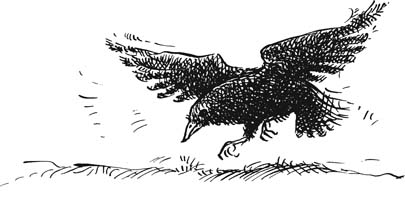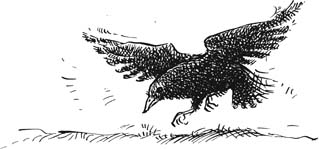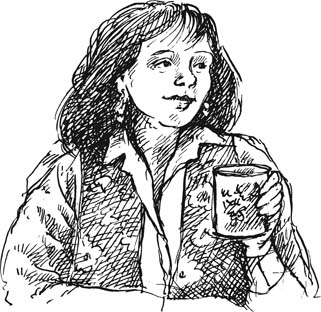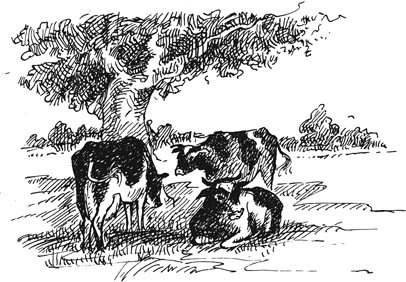Chapter Six
Was it Wiz? Harriet thought.
Whatever was he playing at, sitting in the middle of the lane? He could easily have been run over and then he’d never have seen Pars again.
Was it a hare? her father thought.
These people who came from the town to live in the country couldn’t tell a hare from a rabbit. Probably it was an old tomcat, anyway.
‘You’re sure it was a hare?’ he said.
He thinks I’m a townie who can’t tell a hare from a rabbit, Mrs Lambert thought.
‘I know a Lepus europaeus occidentalis when I see one,’ she said.
‘I don’t follow you.’
‘It’s Latin for the Brown Hare, Dad,’ said Harriet.
‘However do you know that?’
‘I learned it,’ said Harriet truthfully.
‘From a book, I expect,’ said Jessica Lambert. ‘Like me. I illustrate my own little stories, you see, so I have to be careful that I know what a particular animal looks like. I don’t want to make silly mistakes and end up with egg on my face.’
‘Talking of which,’ said Harriet’s father, ‘you must let us give you some more eggs in place of the broken ones. And, more importantly, how is your face?’
‘My nose is a bit sore.’
‘And I’m afraid you’re going to have a shiner,’ Harriet’s father said.
‘What’s a shiner, Dad?’ asked Harriet.
‘A black eye. Look here, Mrs Lambert, you must be a bit shaken. Why don’t you turn round and come on back up to the farm, and we’ll find you some more eggs and give you a cup of tea?’
Anyone watching would have seen quite a procession going back up the trackway to Longhanger Farm.
The little car led the way, the big tractor followed, and close behind it trotted the sheepdog, Bran. A hundred metres or so behind Bran, a hare came loping up the hill.
Just as he reached the yard, some instinct made the dog turn his head to look back, but all he saw was an old crow hopping about, that cried, ‘Caark!’ at him.
‘Do please sit down, Mrs Lambert,’ said the farmer. ‘And put the kettle on, please, Hat.’
‘Isn’t it awful,’ said Mrs Lambert, ‘the way we all get our names shortened?’
‘You can’t shorten mine much,’ said John Butler.
‘No! But what I mean is, for example – my name is Jessica (and please stop calling me Mrs Lambert), which is quite a nice name, I think, as is Harriet. But my husband always called me Jess, which sounds like a sheepdog.’
‘It sounds nice enough to me,’ said Harriet’s father.
‘I’d rather you called me Jessica.’
‘If you call me John.’
‘It’s a deal.’
‘What’s a deal?’ asked Harriet, coming back from the kitchen. ‘I hope you’re not making Mrs Lambert pay for some more eggs, Daddy. It’s my fault the first lot got broken.’
‘Your fault?’ said Mrs Lambert.
‘Well, yes, in a way. It was my hare that caused the accident.’
‘Your hare?’ said her father.
‘Well . . . I mean . . . our hare. A Longhanger Farm hare.’
‘A crazy hare,’ said her father. ‘There must be a story there for you, Jessica – The Mad Hare of Longhanger Farm.’
As Mrs Lambert drove away again, with half a dozen fresh eggs for which Harriet would take no payment, she suddenly saw a hare (the hare? she thought) squatting by the side of the trackway. She slowed down to an absolute crawl, watching it like a hawk, and out of the window she said, ‘You’re not going to do anything silly, are you?’
To her surprise, the animal made a soft but distinct noise in reply. It sounded like ‘Oont.’
‘She’s nice, isn’t she, Dad?’ Harriet was saying.
‘Very,’ said her father.
Why, he thought, did she say, ‘My husband called me Jess?’
‘I suppose Mr Lambert will turn up before long,’ he said in an offhand way. ‘I imagine she’s getting the old cottage straight first.’
‘That’s what Mrs Wisker said.’
‘There’s not much she doesn’t notice.’
‘As her late lamented hubby used to say,’ said Harriet, and they both laughed.
When Mrs Wisker arrived next day, Harriet told her the whole story of the accident.
‘Poor soul!’ said Mrs Wisker. ‘And got a black eye too! Not the first she’d’ve had, from what I hear.’
‘What do you mean?’ asked Harriet.
‘That husband of hers. Free with his fists, they say, specially when he’d had a drop too much, which was often.’
‘How horrible!’ said Harriet.
‘He won’t do it no more, duck. She got rid of him, for good and all.’
‘Murdered him, d’you mean?’
Mrs Wisker gave one of her loudest shrieks.
‘You been seein’ too much telly,’ she said. ‘No – dee-vorced him. Couple of year ago.’
Last thing that day, Harriet was leaning out of her bedroom window, scanning the valley below as usual.
The evening sunshine lay warmly on the fields, and on the cows and sheep that grazed them or lay and chewed their cud, and turned to a purplish colour the furrows of the newly ploughed Ten Acre, where once, not long ago, she had first seen the corn circle.
A few rabbits hopped about the headlands of the pastures but there was no sign of a hare.
So still did Harriet keep that a sparrow alighted on the windowsill, but when she said, ‘Wiz?’ it flew hastily away again.
Her father came in to say good-night.
‘Dad,’ she said. ‘You know Mrs Lambert.’
‘Yes.’
‘Well, Mrs Wisker says she’s divorced.’
‘Oh, really?’
‘Yes. Dad, can I ask you something?’
‘Yes.’
‘When are we going to get some more hens?’




